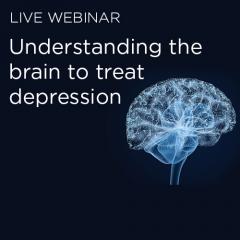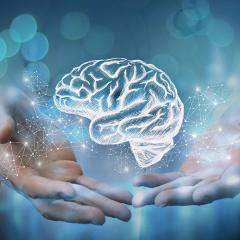The neurobiology of depression presented by Professor Eric J Nestler MD PhD: 2023 Merson Lecture

On Thursday 23 March, the Queensland Brain Institute (QBI) hosted the 2023 Merson Lecture – an annual lecture named in honour of Dr David Merson, who supported the series to promulgate the most impactful brain research.
Each year, a prominent neuroscientist presents their work on a topic associated with research being carried out at QBI. This year, Professor Eric J Nestler MD PhD travelled to QBI from New York to discuss his work on the neurobiology of depression.
Professor Eric J. Nestler is the Nash Family Professor of Neuroscience at the Icahn School of Medicine at Mount Sinai in New York, where he serves as Dean for Academic Affairs, Chief Scientific Officer, and Director of the Friedman Brain Institute.
Despite depression being the number one cause of disease burden worldwide, it is still solely diagnosed based on behavioural abnormalities. There are no blood tests or brain scans to diagnose depression or a biological measure to distinguish it from PTSD and anxiety.

Professor Nestler’s long-term goal is to use the insights he gains through his laboratory’s work on the mechanisms of the syndrome to develop improved diagnostic tests and treatments for depression.
While stress is the strongest known risk factor for depression, susceptibility to stress is complex. Some individuals are susceptible to certain kinds of stress and resilient to others. Susceptibility to adverse stress is based on genetic and environmental factors, with 35% of risk being heritable and 65% determined by life experiences, beginning in utero.
Professor Nestler’s current studies explore the detailed mechanisms by which specific gene expression abnormalities identified in mouse models and human gene mapping contribute to depression.
This work establishes gene expression and epigenetic regulation as important mechanisms underlying how a history of stress causes lasting changes in specific brain regions, which result in depression in vulnerable individuals.
Professor Nestler’s laboratory studies stable changes within these brain regions that control life-long vulnerability to different forms of stress and the induction of depression.
A major finding from this work is the dramatic difference in the effects of stress and depression in males versus females.
Post-mortem RNA sequencing on human brains found only a 5-10% overlap in genes expressed abnormally across brain regions in depressed and normal men compared with depressed and normal women.
Similarly, in mouse models of depression, male and female mice that show similar behavioural abnormalities when exposed to stress exhibit very little overlap in affected genes.
Professor Nestler’s work suggests that depression is a vastly different experience for males and females. The goal of this research, in light of these findings, is a move towards sex-specific diagnostic tests and treatments.
Watch the recording of Professor Nestler's lecture
See QBI's latest research on depression
Ketamine-associated change in anhedonia and mTOR expression in treatment-resistant depression
Modulating neuroplasticity: lessons learned from antidepressants and novel therapeutics



